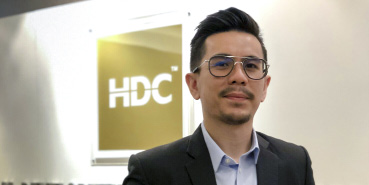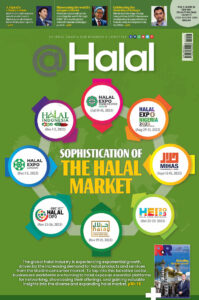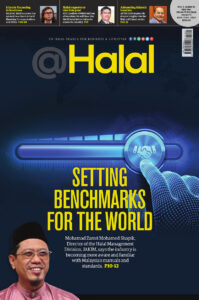Panellists agree on the push towards digitalisation to broaden Islamic economy
IT IS unexpected to witness how severely the Covid-19 pandemic has shaken the world. Some business shattered, but some are thriving.
Since 2013, the State of the Global Islamic Economy (SGIE) Report, produced annually, had become the go-to global reference for the Islamic and halal economy-related industry executives, investors, national economic development officials and entrepreneurs.
While 2020 turned out to be an unusual year, the report was launched through a series of remarkable worldwide virtual events in 12 countries on Nov 16-Dec 14.
For the first time, the launch events were broadcast live, where the report presentation and panel discussions interspersed with quizzes and multimedia content. This year, the Malaysia Digital Economy Corporation (MDEC) partnered with other entities for the SGIE report launch as part of the Malaysia Tech Month 2020 (MTM 2020).
The virtual launch of SGIE Report in Malaysia welcomed a few notable individuals from the industry to give their views on the report. For the discussion on ‘Thriving in Uncertainty’, the panellists were Norhizam Abdul Kadir (MDEC Vice President of Fintech & Islamic Digital economy), Hussam Sultan (Regional Head of Commercial Banking CIMB), Seri Azalina Mohd Ghazali (Manager of Duopharma Biotech Berhad) and Dhaliff Anuar (Head of Halal Consultancy of Halal Development Corporation).

Dhaliff Anuar

Hussam Sultan

Norhizam Kadir

Rafi-uddin Shikoh
The session was moderated by the Senior Manager of Dinar Standard, Simeen Mirza. And the welcome note was by MDEC’s Norhizam, who represented his chairman, Datuk Wira Dr Rais Hussin.
CEO and Managing Director of Dinar Standard, Rafi-uddin Shikoh, highlighted in his keynote speech: “This year, over 52 industrial professionals were interviewed across all sectors, with leverage of Islamic finance data and data which are primary research of Dinar Standards’ own on Muslim population estimated investment tracking, innovation tracking, and halal regulation tracking.”
On its secondary data compilation, Dinar Standards has come across thousands of stories related to the Islamic economy in 2020. Over 450 reports from multilateral agencies, including the United Nations, World Bank, the International Monetary Fund (IMF) as well as other organisational public data, were referenced in the report.
From a digital driver point of view
There are a lot of opportunities within the Islamic economy, said Norhizam. In fact, if we were to look at the report, there are a lot of digitalisation across the sectors.
Throughout the pandemic, digital technologies have proven to be a practical solution. As such, we were able to conduct a virtual launch of the State of the Global Islamic Economy Report 2020/21.
Norhizam said: “Digitalisation has been able to cut across sectors. Twenty-five years ago, when MDEC started, digital technologies previously called Information and Communications Technology (ICT) was just moving at a vertical. Now, we see that things are changing. Digitalisation is happening in every single sector. This has helped the Islamic economy sectors to create better efficiency and productivity. “
From a financial industry point of view
Hussam said: “Digitalisation has become what Muslims called as Fardu Kifayah (tasks which are not as essential and not required to be done by everyone) to Fardu Ain (tasks which are a necessity and needed to be done by everyone).
“We say this because when the first lockdown happened, we have seen a lot of SMEs which want to continue to sell. We see those who have access to e-shops, they offered products online. Therefore, commercial banks have responded to this by offering special financial support catered for SMEs. That was our priority – to help our customers survive.”
Looking at the report, Hussam said although the Islamic finance sector showed top performance, there was a need to change strategy in the Islamic finance sector. CIMB opened its offer on e-commerce financial solution for not only large businesses but also for SMEs and micro-SMEs.
Digitalisation is seen as the most crucial tool for a way forward to survive the unprecedented pandemic.
From a pharmaceutical manufacturer point of view
On another view from leading pharmaceutical manufacturer Duopharma Biotech, The Global Islamic Economy Report was described as “a very good insight”.
Shared Seri Azalina: “As a manufacturer, there is a need for us to know the current market share, the current halal lifestyle and what are the best ways to reach out to the consumers. We always look forward to producing something that is catering to the lifestyle.”
The report has specifically highlighted some of the thoughts of Gen-Z on the halal industry. The section was one of the features of interest as Duopharma took it as an opportunity to cater to the market by offering the Gen-Z’s potential product of interest.
Adding to that, Seri Azalina also mentioned the need for Duopharma to really explore the digital space and not only focus on product manufacturing.
“We are trying to map out the scenario right now, and I believe the report can help us to fill in some of the information we are looking for, especially in the halal space.”
From a halal mover point of view
Dhaliff also saw the importance of digitalisation. As a corporation promoting the halal industry, Dhaliff said HDC now offered an halal integrated platform (HIP).
“HDC used to have a physical halal one-stop-centre in Kuala Lumpur. Now we are bringing that one-stop-centre into a platform in keeping up with the Industrial Revolution 4.0.“
The online platform combines every service provided under HDC, which are targeted for all — halal industrial practitioners, business society, academic practitioners as well as public users. HDC is also expecting to enlarge the platform by opening an online halal marketplace.
“For Malaysia, with halal being at the forefront in its strategies by government departments and financial institutions, the future will be even better for halal sectors globally,” added Hussam.








